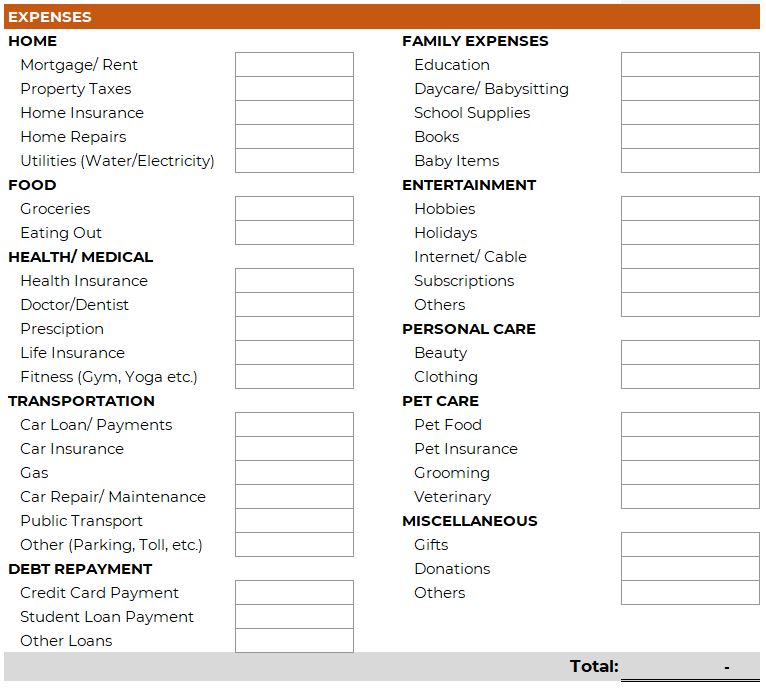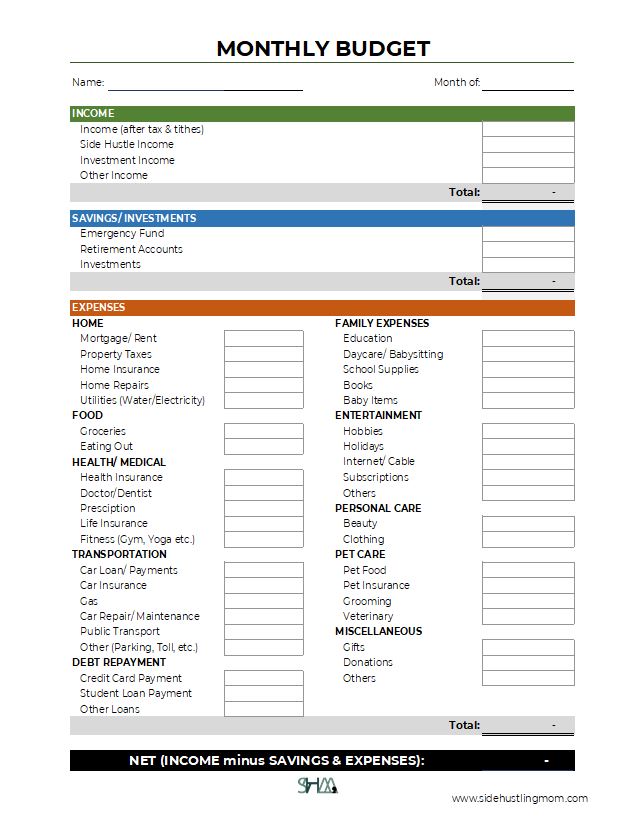This post may contain affiliate links to products or services. I may receive a commission for purchases made through these links with no cost on you. Please read my disclosure for more information.
How to budget money on low income? Is it possible? The short answer is yes, but it is not easy.
I’ve witnessed and experience how our mom was able to do just that. With one source of income and 8 children, she managed to budget money on low income household.
Mind you, she did not graduate high school and were able to send 7 children to school all at the same time.
Creating and sticking to a budget may seem a daunting task for most of us especially if you are coming from the low-income household.
But, once you start budgeting, you will find that creating ways to save more money can be challenging yet fulfilling.
WHAT IS A MONTHLY BUDGET?
A monthly budget is a plan that helps you manage your money by listing your expected income and allocating some to your expenses in a specific month.
It typically includes categories such as income, expenses, and savings.
The goal of having a monthly budget is to ensure that you allocate your money wisely, avoid overspending, and have enough for your needs and priorities.
When you have a low income, you have less flexibility in your budget. You need to plan for every money that comes in.
Having a budget provides you with a clear picture where your money goes and helps you make informed decisions about your spending habits to make necessary adjustments.
HOW TO BUDGET MONEY ON LOW INCOME
1. List Down Your Income

First things first. You need to understand your cash flow every month, that is the money coming in and money coming out.
No matter how much you make, your income is the first line item in any budget. Because if you don’t know how much is coming in, how can you possibly know how much you can spend this month?
Make a list of every source of income you have. This covers all sources, including salaries, side jobs, part-time employment, stipends, child support, disabilities, and social security.
Additionally, if you have an irregular income or work on commission, be conservative and always start with your lowest monthly income.
2. List and Prioritize your Expenses

Identify all your expenses, then start prioritizing them based on their importance.
In making your budget, make sure the basics are taken care of first.
You can start by listing for food, shelter, utilities, and transportation.
After these things, you can list other expenses such as house maintenance, insurance, medical costs, entertainment, debt repayment, etc.
3. Create a Realistic Budget

Next, you need to develop a budget that reflects your actual income and expenses.
You must be realistic in allocating an amount based on what you can afford. Try to avoid underestimating or overestimating your financial situation.
After allocating an amount to your expenses, subtract your total income from your total expenses. What is the result? Is it a positive or negative?
You can get my FREE Monthly Budget Spreadsheet to make calculations easy for you.
Note: My monthly budget spreadsheet has pre-filled income, savings, and expenses categories. All you have to do is edit it based on your needs.
4. Categorize and Cut Unnecessary Expenses
After drafting your budget, you will have a clear picture of how much is left in your income after the expenses.
Then you realized, “Oh no! I don’t have enough money to cover all my monthly expenses”.
Okay, take a deep breath, and don’t panic.
I know it can feel overwhelming when you’re looking at the (negative) numbers. But we’re about to make some changes to help fix that!
Review and categorize your expenses if they are needs or just wants.
So, from your budget, remove or reduce your expenses that are categorized as “want”.
You can now identify the areas where you can cut back without compromising your basic needs.
Get this. You must reduce or cut the “want” expenses, be more intentional about your spending, and make some sacrifices now. Most probably, you’ve been relying on debt to fill in the gaps before now.
Later, if you have enough money to budget, you can slowly put back one by one.
By doing this, you are practicing frugality and “delayed gratification”.
5. Review and Adjust
Regularly review your budget and track your spending to identify areas where you can adjust and improve.
This is important so that you will not lose track of your budget. Because there might be a change in your circumstances that can impact your budget.
TIPS FOR COVERING EXPENSES IF YOU HAVE LOW INCOME
After setting your budget and cutting your expenses, you may still not have enough cash to cover your monthly expenses. What can you do?
Here are some tips if your income doesn’t cover your expenses:
1. Look for Additional Income Sources
One solution will be to look for another source of income.
Explore opportunities for additional income, such as part-time work, freelance gigs, or online jobs.
Even a small supplementary income can make a significant difference, especially if you are sticking to your budget.
Recommended reading: 23 Summer Side Hustles to Earn Extra Money
2. Shop Smart
Seek out discounts, use coupons, and take advantage of store sales to save money on essential purchases.
You can sign up for free weekly newsletters from your local grocery store to stay updated on their latest deals.
Another tip is to look at the clearance section while shopping to find extra savings. Just be cautious about the expiration dates of food items.
You may also consider buying second-hand clothes, furniture, and other items from thrift stores, flea markets, or online marketplaces.
Some people even purchase stuff second-hand and flip it for a profit. This is a great way to save money and create a side hustle for yourself.
Recommended reading: 21 Creative Ways to Save Money on Groceries
3. Sell Online
In this present world, I’ve seen a lot of online sellers make a fortune.
If you are a person who is good at selling, online selling might be a good fit for you.
You could sell your products online like handmade crafts, bath and body products, DIY kits, smartphone accessories, homemade food, and baked goods, etc…
Or you could sell or recommend other people’s products and make a profit out of it.
You could also declutter your home and sell items you no longer need. This will not only give you room to breathe but also give you instant cash.
Recommended Reading: How to start Selling on Etsy in 6 Simple Steps, 24 Popular Digital Products to Sell on Etsy
3. Reduce Your Water & Energy Consumption
Cut your utility costs by turning off lights, unplugging electronics, and using energy-efficient appliances.
Turning off or lowering your AC/ heater a couple of degrees when you aren’t home is a great way to save money on pricy utility bills.
You can also wash your clothes every week to cut the cost of water, electricity, and detergent soap/ softener.
Or as much as possible, run appliances (like a dishwasher and washing machine) only when they’re full.
4. Cook at Home
Preparing meals at home is generally cheaper and way healthier than eating out, and it allows you to plan for cost-effective ingredients.
Meal planning or prepping is a simple and easy way to help save money.
For example, if you spend $10 on lunch Monday-Friday, that is $50 a week, which is $200 a month and $2,400 a year.
That means you are spending an extra $2,400 a year to eat out for lunch, and that is only one meal. How about your breakfast and dinner?
Simply packing lunch every day of the workweek will save you thousands of dollars a year.
Pack lunch for work rather than eat out.
5. Reduce Transportation Costs
If you have a car, instead of using it, you can walk, bike, carpool, or use public transportation to save on fuel and maintenance expenses.
You can also consider renting or selling it to make extra money.
Make a comparison of the pros and cons of having a car to come up with a better decision.
You can also consider shifting house closer to your office. It will save you time and transportation costs.
6. Ask for a Promotion or Raise
If you feel like your pay doesn’t match with the effort you put into your job, try asking for a raise.
You’ll have to do some planning before you bust into your manager’s office and ask for a promotion or salary increase.
However, if you believe you deserve to make more than your current salary, it’s worth starting the conversation and discussing your qualifications.
7. Switch Jobs
If asking for a promotion or raise doesn’t sound good to you. Or you feel trapped in a job with low pay and little to no opportunities for growth.
Then, it’s probably time to look for another job.
Look for a better company or maybe switch career paths altogether.
Either way, there are plenty of opportunities out there that will help you make more money and do the work you love—without having to go back to school.
8. Negotiate Bills
You can contact service providers to negotiate better rates for services like internet, and insurance.
Most companies constantly run deals and will work to keep you as a customer.
If you like, you can get quotes from multiple companies and see if your current provider can match their competitor’s price.
They might be willing to give you a better deal, or else, move to another provider.
9. DIY Projects
Do some basic home repairs and projects independently instead of hiring professionals.
If you can also do minor home renovations yourself, this will save you money.
The Internet has become more advanced and most of the problems we face can be found on the internet.
If you need to fix a clogged sink, just “google” the problem and you will find a list of solutions. All you need to do is follow the steps and you can fix/ learn almost everything.
10. Rent What You Have
If you have a spare room, let someone rent it so you can share the rent (or even the utility bills).
If you have a car, truck, or bicycle, you may want to hire it to someone else for a day.
Also, you may have a piece of equipment that can be rented such as a drill, lawn mower, etc…
Sometimes we may overlook and ignore the things we have in life, use them well.
3 THINGS TO DO IF YOU HAVE EXTRA MONEY
I congratulate you if you have a positive cash flow (excess money after subtracting all expenses).
In my monthly budget worksheet, you will find that there’s a “Saving” category after “Income”.
Ideally, at least for me, you have to set aside cash for “savings” such as emergency funds, investments, and retirement.
If your budget allows and happen to have extra cash, try to set aside even a small amount for the following:
Emergency fund: Allocate even a small amount for your emergency fund. Over time, it will accumulate. Start small by just putting in $20 weekly, and slowly increase the amount you put away over time. $20 might not seem like a lot, but over the course of a year, that is $1,040 you would have put away.
Having a financial cushion can help you handle unexpected expenses without ruining your budget.
Debt Payment (if you have): While saving, you also need to reduce your liabilities so you can save the interest rates. Eliminating debt will have a liberating impact on your life and finances.
Start a Retirement Fund: Most companies have retirement plans, take advantage of it. However, if you have irregular income or are self-employed, you can enroll yourself in a government-regulated retirement scheme. In the Philippines, we have Social Security System (SSS) and Pag-Ibig Fund. Putting away money for your retirement is always important.
CONCLUSION
Budgeting money on a low income is possible but not easy. There are sacrifices and lifestyle adjustments to make.
Remember, budgeting takes time and effort.
Be patient and stay committed to your financial goals.
In the end, you will develop the discipline in properly handling your money. It will also help you to live a simple yet fulfilling life.
ACTION PLAN
- Get my FREE Monthly Budget Spreadsheet.
- List your income and expenses.
- Prioritize important expenses and allocate realistic amount.
- Subtract your total income from your total expenses. What is the result? Negative cashflow?
- Cut unnecessary expenses.
- Check out tips for covering expenses if you have a low budget.
Cheering for you!





